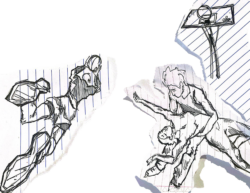“Water Pistol Pete Junior.” On Tuesday, former NBA player Jalen Rose gave fellow ESPN analyst Skip Bayless the nickname, mocking Bayless’s false claims about his high school playing days. Bayless claimed to have been the starting point guard for a state championship contender, which gave him the skill and expertise to criticize Russell Westbrook’s shoot-first mentality.
But the wheels came off when sources tore down Bayless’s credibility, finding that he scored a grand total of 21 points as a senior bench player in high school. Though the lie tarnishes his reputation, Bayless’s slip-up was very much in character.
Bayless has made a career out of openly criticizing athletes in harsh terms, like calling Chris Bosh “Bosh Spice” and referring to LeBron James as “Prince James.” He established himself as a journalist and a man that knows sports, and as such he does not need the credibility of being a former All-Star point guard to validate his opinion.
Skip seems even to embrace his role as an outspoken villain, one whom athletes love to rip apart. That trend seems to be more common in the media, but certainly not among athletes, who simply want to be loved and adored.
Exhibit A: LeBron James. Exhibit B: Dwight Howard.
In the same manner as Bayless, LeBron lost his credibility and the respect of many fans overnight with his dramatic decision to leave Cleveland for Miami in the summer of 2010. Both men will always be criticized, but both accept their roles as villains (though it still gets under LeBron’s skin from time to time). Howard, on the other hand, cannot bear the thought of being hated, especially by an Orlando fanbase that has adored him since the Magic drafted him in 2004.
Yet, as it stands today, he is the biggest phony of all three. Howard came out of high school as an affable and strongly Christian man, just trying to establish a foothold in the NBA. For years, that trend continued, as he carried the Magic to an NBA Finals appearance (albeit in an extremely weak Eastern Conference) and made himself the NBA’s version of Superman with his athleticism.
Then, as speculation abounded this season, Howard demanded a trade from Orlando to the New Jersey Nets. That’s fine and well, at least in today’s day and age, where he was simply following Carmelo Anthony’s precedent from less than a year prior.
But Howard did not stop there, as he flip-flopped throughout the process and tried to pin the media as the bad guy skewing all of his words. Dwight was a loyal guy, all-in and all for the Magic, at least in the public’s eyes. But with the trade process, the public got the insider look at what Howard truly desired, and the two appearances conflicted drastically.
The saga reached a precipice when the media began reporting that Howard had asked the Magic to dismiss its coach, Stan Van Gundy. Howard, in a bizarre scene, came to Van Gundy’s side and once more blamed the media for the rumors, not knowing that it was the coach himself who had informed them of the story.
In an effort to be loved by all, Howard suddenly became the least credible athlete in all of sports. He was exposed for his manipulative ways, no longer shielded by the same Orlando management that he tried to escape from. Instead, he proved that Bayless’s criticism of Howard as “the LeBron James of big men” was indeed true. Of course, Howard rebutted that claim with the same athlete vs. media mentality that backfired on him.
“I don’t think he’s ever put on a jock strap, stepped on the floor and played any type of basketball,” Howard said of Bayless. “That’s his job. That’s their job to criticize players.”
It’s good to see Howard acknowledging Bayless’s role in the sports world. His main problem, though, is that he does not know his own role—flipping between general manager and victimized basketball player to simultaneously get his way and keep his fans.
At heart, Howard is an immature superstar—nothing else can explain his eleventh-hour decision to opt in for an extra year with the Magic. He may be a once-in-a-generation talent, but that does not make up for his mentality.
A general manager or a coach can probably look past a number of incidents—the Van Gundy episode, his disappearance in fourth quarters, and his rumored quitting of the team, to name a few—because of his sheer talent. But to the fans, his act is up. Howard is not the beloved superstar he once was. Instead, he’s a villain, in the same boat as Bayless and James. Like his two hated counterparts, he needs to move past it and get back to what he’s good at – no more theatrics, no more manipulation. Just basketball.



